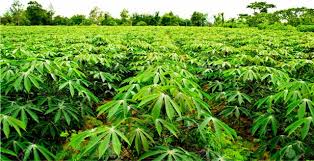Mechanized Cassava Tuber Cultivation, Garri and Starch Production in Nigeria; The Feasibility Report.

Cassava is the most important root crop in Nigeria. Apart from being a staple crop in both rural and urban household’s cassava is a major source of income to cassava farmers and processors in the rural areas.
Cassava alone contributes about forty-five percent (45%) of agricultural gross domestic product (GDP) in Nigeria for food or domestic purposes but its industrial processing and utilization has been very limited.
Currently, the country produces about forty million (40,000,000) tons of the cassava tubers annually and due to the desire of the federal government to reduce import dependency and conserve of scare foreign exchange, there is need to increase the production of cassava starch as an alternative to corn starch.
Starch is an integral part of adhesive formulations and is used in wide range of industrial applications. Being a rich source of carbohydrates, cassava starch is used as a major ingredient in a number of food products.
The global food industry is currently growing at a rapid pace due to urbanization, expanding working population and rising household incomes, especially in the emerging nations like India and China.
This is has led to an increase in the demand for ready-to-eat food products which has stimulated the growth of the cassava starch industry.
Earlier, the usage of cassava starch was largely confined to food applications, however, owing to its easy availability; it is also being utilized for non-food applications like manufacturing pharmaceuticals, adhesives, papers, etc. Growth in these end-use industries is providing a thrust to the market growth.
In the textile industry, cassava starch is used for sizing, finishing and printing due to its flexibility, resistance to abrasion and the ability to form a bond with the fiber. In finishing, cassava starch is utilized to cover blemishes or defects and provide a finishing look to the end product.
Increasing westernization is fueling the growth of the textile industry, in turn, boosting the cassava starch market.
The growing health consciousness along with the rising cases of diabetes has stimulated the demand for artificial sweeteners across the globe. The increasing demand for these sweeteners is expected to drive the cassava starch market in the coming years.
The demand for cassava starch in Nigeria is high. The driving force behind the demand is the federal government policy on cassava starch substitution for corn starch.
The annual national demand for cassava starch is estimated at three hundred and fifty thousand (350,000) tons while the national supply estimate is about three hundred thousand (300,000) tons.
Garri, a product gotten from the processing of cassava tubers is a very important staple food item in Nigeria. It is one of the food items that defy socio-economic class, religious and ethnic boundaries, it is doubtful if it is not eaten daily in one of every two homes in the country.
Garri is a creamy-white, granular flour with a slightly fermented flavour and a slightly sour taste made from fermented, gelatinized fresh cassava tubers. Garri is widely known in Nigeria and other West African countries.
It is a popular West African food. It is most widely eaten as Eba. Eba is made by sprinkling garri into a bowl or pot of boiling water and stirred until dough of garri is formed. You could add more water to the dough and stir to your desired texture. The finished product is called eba.
The annual national demand for garri is estimated at one million (1,000,000) tons while the national supply estimate is about two hundred and fifty thousand (250,000) tons.
This coupled with the geometrically exploding population and continued rural-urban drift continues to fuel the demand for food stuffs especially Garri, a staple food in the country.
This report seeks to examine the financial viability or otherwise of establishing a mechanized cassava plantation, garri and cassava starch production plant in Nigeria.
The size and locations of the farms is two thousand (2,000) hectares of land located in Edo State. One thousand, nine hundred and twenty (1,920) hectares would be used for the farm while the remaining eighty (80) hectares would be used for the construction of the production facility and other civil works.
Improved cassava stem (TME 419) would be sourced from International Institute of Tropical Agriculture (IITA), Ibadan and used on the farm. Yield of twenty (20) tons yield per hectare and gestation period of nine (9) months from time of cultivation were assumed.
The proposed plant would comprise of Cassava Starch Plant, Garri Production Plant, Generator, Wagon Balance (Weight bridge), Transformer and Electrical Poles, Weighing Machine, Wood Pallets, AGO storage tank and Forklift. Other equipment’s includes delivery trucks, John Deer tractor, Motorised Knapsack Sprayer, Cassava harvesting machines, cassava planting machines, disc harrows and stump removals.
The production capacity of the proposed plant is twenty (20) tons per day for the cassava starch and twenty (20) tons per day for the garri plant operate for double shift of eight (8) hours each per day at eighty percent (80%) of the installed capacity and working for three hundred (300) days per annum. The input / output ratio of 4:1 was assumed for the cassava starch and garri.
The plant would purchase cassava tuber from suppliers for the first nine (9) months to make up for when the farm would start yielding and the tubers sourced internally.
Table of Contents
EXECUTIVE SUMMARY 1.0 Business Overview 1.1 Description of the Business 1.2 Vision and Mission Statement 1.3 Value Proposition 1.4 Critical Success Factor of the Business 1.5Current Status of Business 1.6 Description of the Business Industry 1.7 Contribution to Local and National Economy 2.0 Agricultural Practice 2.1 Land Preparation 2.2 Collection of stems 2.3 Planting 2.4 Manures and Fertilizers 2.5 Weeding 2.6 Climate / Irrigation 2.7 Harvesting and Yield 2.8 Herbicides 2.9 Soil Type 2.10 Diseases and Pests 3. Marketing Plan 3.1 Description of product 3.2 Product Packaging and delivery 3.3 The Opportunity 3.4 Pricing Strategy 3.5 Target Market 3.6 Distribution and Delivery Strategy 3.7 Promotional Strategy 3.8 Competition 4. Production Plan 4.1 Description of the Location 4.2 Raw Materials 4.3 Production Equipment 4.4 Production Process 4.5 Production Cost 4.6 Stock Control Process 4.7 Pre-Operating activities and expenses 4.7.1 Operating Activities and Expenses 4.8 Project Implementation Schedule 5.0 Organizational and Management Plan 5.1 Ownership of the business 5.2 Profile of the promoters 5.3 Key Management Staff 5.3.2 Management Support Units 5.4 Details of salary schedule 6. Financial Plan 6.1 Financial Assumption 6.2 Start -Up Capital Estimation 6.3 Source of Capital 6.4 Security of Loan 6.5 Loan Repayment Plan 6.6 Profit and Loss Analysis 6.7 Cash Flow Statement 6.8 Viability Analysis 7.0 Business Risk and mitigation factor 7.1 Business Risks 7.2 SWOT Analysis
Project Specification:
Additional Info
Get this Report
Direct bank transfer
To order the report, Please do pay the sum of ₦200,000 into
Account Name : Foraminifera Market Research Ltd
Account Number : 274 20 569 37
Account Name : Foraminifera Market Research Ltd
Account Number : 101 76 603 95
Account Name : Foraminifera Ventures
Account Number : 011 66 066 32
Make your payment directly into our bank account. Please use your Order ID as the payment reference. Your order will not be shipped until the funds have cleared in our account.
Instructions
After payment call us on 01 -29 52 413 / 08033782777 or email us at foraminiferamarketresearch@yahoo.com with the payment details. After payment confirmation, the soft copy of the report would be sent to you within 24 hours.



